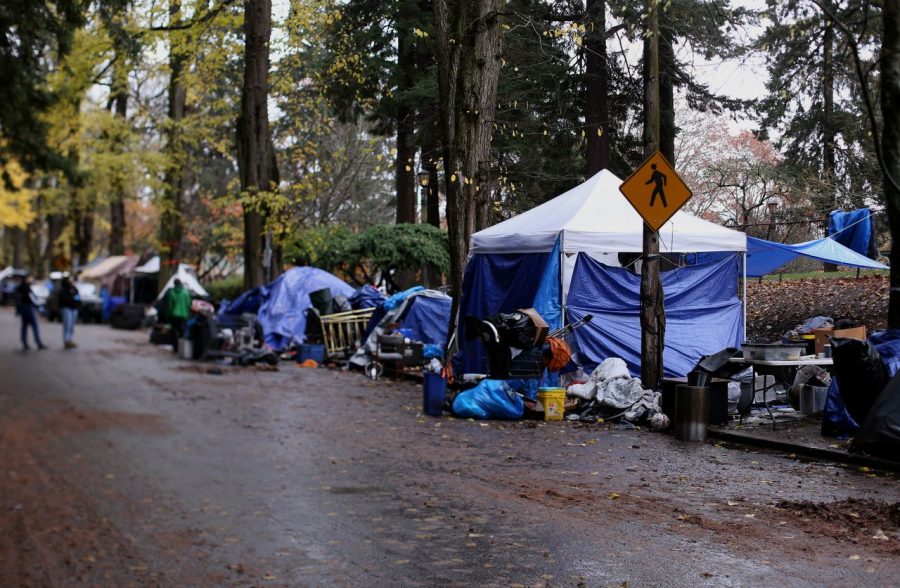Mayor Ted Wheeler Sends Portland’s Homelessness Into a State of Emergency
Homeless camps grow throughout Downtown Portland.
April 7, 2022
Throughout the past couple of weeks, our Portland mayor, Ted Wheeler, has announced that the city will be going through a state of emergency regarding the increasing homeless population.
Within the last decade, Oregon declared its border doors open to take in other states’ homeless people. An initially moral plan, however, the decision only significantly raised Oregon’s population, and the streets of Downtown Portland quickly became a tragedy.
Since the government doesn’t make it easily accessible to provide consistent support to those living outside, causing funding to be a challenging obstacle, fortunately, in November of 2021, the city approved a thirty-eight million dollar grant and portioned the majority of the aid towards supporting homeless people and campsites. Mayor Wheeler has implemented the Street Services Coordination Center, a response team focused primarily on expanding access to services. As the Street Services Coordination Center will be overseen by Community Safety Director, Mike Myers, there will now be publicly released information on the daily bed count at numerous shelters throughout the city, developing navigation teams, and transportation through outreach workers to connect Portlanders ‘ living among the streets to on-demand shelters.
“Despite the best of our intentions, things just aren’t improving to the degree we would like to our homeless neighbors. Our city needs to have clear rules about street behavior, urban camping, and consistent reinforcement. Unsheltered homelessness has continued to grow in Portland despite enormous investments. Given the urgent need to maximize results from limited public resources and personnel, the City of Portland and Multnomah County must pull its decentralized programs and service into a collaborative team under a coordinated command structure,” announced Mayor Wheeler.
As Oregon’s COVID numbers are decreasing and warmer weather is just around the corner, Mayor Wheeler has recognized a unique opportunity to produce a structural change in an attempt to break through the homelessness crisis. With an average 95% homeless population, Mayor Wheeler has declared the Street Services Coordination Center will not effectively fix the growing homelessness issue but keep the streets cleaner and those who choose to live on the streets. Whether it’s a choice to live on the streets or a last resort to live outside, there are an unfortunate amount of homeless people who are sexually assaulted, robbed, harassed, accidentally cause fires from trying to stay warm, reside amid high crash sites, and other alarming dangers in Portland and all other the world.
Alongside the Street Services Coordination Center, Mayor Wheeler and Myers collaborate to produce a Hub to have operational by this summer. Four city commissioners lose some oversight power regarding bureau interactions to work partners and coordinate with staff from the Joint Office of Homeless Services and first responders.
“The Street Services Coordination Center and the Hub quickly gets real offers of shelters, transportation, and services to people living on the streets, in their vehicles, and in campsites through new and existing resources,” mentions Mayor Wheeler.
With Portland searching for a spectrum of shelter and behavioral health options to serve as a safety net to all, these centralized response units allow staff members to easily refer people they encounter to shelters, behavioral health centers, and substance abuse treatment centers as a second chance at a life away from the streets. As Mayor Wheeler and Portland work together to reduce our significantly increasing homeless population, the Street Services Coordination Center and the Hub have aquaintted with several resource centers, including Pavement Dweller Centers, Transition Projects Resource Center, Shepherd’s Door, and many others to give hope to those in need.
With summer approaching, we can hope those living on the streets get another chance for a substantial and safe life and see our city beautiful again.





